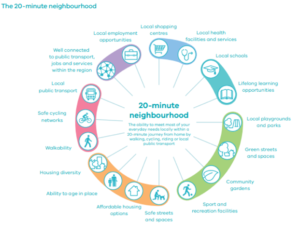By Chantal Burns Posted 29 March 2023 As the impacts of global overheating increase, so does our need for local community resilience. This includes our ability to access and share resources closer to home. The concept of 20-minute neighbourhoods (also called 15 minute cities) helps to address this need. It means that residents can access every day essentials within 20 minutes, by foot, bike or local transport. Amenities would include doctors, dentists, groceries, workplaces, green spaces and leisure facilities. Scotland has recently approved plans for creating districts that meet the 20-minute criteria. And Bristol, Oxford, Sheffield and Canterbury councils are all looking at introducing it into their planning too. This ‘everything on your doorstep’ concept has been trialled in many parts of the world for years now, and in Europe it’s become a key measure of how liveable a city or town is.  The benefits include reducing air pollution, improving public health by more walking and cycling and less unnecessary ten minute car trips to pick up a loaf of bread. And you get more time back because let’s face it, who wants to sit in traffic for 50 minutes or take a tricky train journey just to do some food shopping, if it can be done locally. Source: Plan Melbourne, Department of Environment, Land, Water and Planning I really appreciate being able to walk to my local supermarkets and not having to take the car. I get far more exercise and fresh air as a result. But disinformation about this important initiative is rife and has led to backlash and protests. Some MP’s have been perpetuating outlandish ideas that 20-minute neighbourhoods are a dystopian agenda to curtail freedom of movement and control our lives. For some reason, being able to walk to your local shop to buy some bread and milk is something we should be deeply concerned about. It doesn’t help that city road closures and diversions to encourage drivers to avoid congesting town centres is being conflated with ‘20 minute’ plans to justify the idea that our freedoms are under threat. Don’t get me wrong. There’s a grain of truth in every conspiracy theory. There are many places in the world where freedoms and human rights are being violated. In Afghanistan women are once again not allowed to have an education outside of the home. There are many examples of governments who are eroding democracy and trying to control their populations. But the 20-minute neighbourhood uproar is like the Covid passport debacle. You might remember how we were all going to be jabbed with a digital passport placed under our skin, tracking our every move. You’ll struggle to get a normal passport with all the strikes going on. What we are seeing here is two different issues being merged. One is the theory of increasing interventions becoming some kind of state control. And the other is a genuinely sensible, people and planet friendly concept that will address some fundamental climate related disruption that we desperate need to adapt to. But if we have learned anything it’s that disinformation can spread faster than a California wildfire. There are people who believe that the 20-minute neighbourhood scheme has sinister intentions, that residents won’t be allowed to leave their local area and we’ll need a pass to travel to another town. This is complete fiction but not in the minds of those who believe it. And falsehoods love nothing more than company and plenty of reinforcement. So let’s have a reality check. The 20-minute neighbourhood is not new. Many of us have grown up in towns and cities where we can reach essential amenities close to home. By the age of 11, I was walking or taking the bus to our local school and shops. You might even remember the outcry from residents and business owners when their high street shops began closing in favour of the out of town hypermarket. If anything, having a broader range of what you need close to home can only increase freedom and choice. To bring some balance, there are some legitimate concerns which need to be considered and resolved. Not everyone has what they need on their doorstep. Not everyone has great public transport or safe cycling zones. Some of us have to travel a longer distance to reach our workplace, hospitals or schools. Many cities or towns will have to re-design and invest significantly to meet the criteria for a 20-minute neighbourhood. Yes it will require an intervention by governments around the world, to bring back something that was a normal way of living 30 years ago. One that we welcomed and appreciated. And if we want to experience resilient communities that can live well in the face of climate related disruption, then you could argue that this way of living will become essential in the coming years. Why would anyone complain that most of our daily essentials are within easy reach, without needing a long or expensive journey? How great would it be if everyone could jump on a bus to their local shops, doctors surgery or parks. This isn’t about control, it’s about what we need and Mother Earth is crying out for. If you want to learn more, listen to our conversation with Gemma Hyde on our YouTube channel as part of our Adapting to an Uncertain Future series.
The benefits include reducing air pollution, improving public health by more walking and cycling and less unnecessary ten minute car trips to pick up a loaf of bread. And you get more time back because let’s face it, who wants to sit in traffic for 50 minutes or take a tricky train journey just to do some food shopping, if it can be done locally. Source: Plan Melbourne, Department of Environment, Land, Water and Planning I really appreciate being able to walk to my local supermarkets and not having to take the car. I get far more exercise and fresh air as a result. But disinformation about this important initiative is rife and has led to backlash and protests. Some MP’s have been perpetuating outlandish ideas that 20-minute neighbourhoods are a dystopian agenda to curtail freedom of movement and control our lives. For some reason, being able to walk to your local shop to buy some bread and milk is something we should be deeply concerned about. It doesn’t help that city road closures and diversions to encourage drivers to avoid congesting town centres is being conflated with ‘20 minute’ plans to justify the idea that our freedoms are under threat. Don’t get me wrong. There’s a grain of truth in every conspiracy theory. There are many places in the world where freedoms and human rights are being violated. In Afghanistan women are once again not allowed to have an education outside of the home. There are many examples of governments who are eroding democracy and trying to control their populations. But the 20-minute neighbourhood uproar is like the Covid passport debacle. You might remember how we were all going to be jabbed with a digital passport placed under our skin, tracking our every move. You’ll struggle to get a normal passport with all the strikes going on. What we are seeing here is two different issues being merged. One is the theory of increasing interventions becoming some kind of state control. And the other is a genuinely sensible, people and planet friendly concept that will address some fundamental climate related disruption that we desperate need to adapt to. But if we have learned anything it’s that disinformation can spread faster than a California wildfire. There are people who believe that the 20-minute neighbourhood scheme has sinister intentions, that residents won’t be allowed to leave their local area and we’ll need a pass to travel to another town. This is complete fiction but not in the minds of those who believe it. And falsehoods love nothing more than company and plenty of reinforcement. So let’s have a reality check. The 20-minute neighbourhood is not new. Many of us have grown up in towns and cities where we can reach essential amenities close to home. By the age of 11, I was walking or taking the bus to our local school and shops. You might even remember the outcry from residents and business owners when their high street shops began closing in favour of the out of town hypermarket. If anything, having a broader range of what you need close to home can only increase freedom and choice. To bring some balance, there are some legitimate concerns which need to be considered and resolved. Not everyone has what they need on their doorstep. Not everyone has great public transport or safe cycling zones. Some of us have to travel a longer distance to reach our workplace, hospitals or schools. Many cities or towns will have to re-design and invest significantly to meet the criteria for a 20-minute neighbourhood. Yes it will require an intervention by governments around the world, to bring back something that was a normal way of living 30 years ago. One that we welcomed and appreciated. And if we want to experience resilient communities that can live well in the face of climate related disruption, then you could argue that this way of living will become essential in the coming years. Why would anyone complain that most of our daily essentials are within easy reach, without needing a long or expensive journey? How great would it be if everyone could jump on a bus to their local shops, doctors surgery or parks. This isn’t about control, it’s about what we need and Mother Earth is crying out for. If you want to learn more, listen to our conversation with Gemma Hyde on our YouTube channel as part of our Adapting to an Uncertain Future series.

